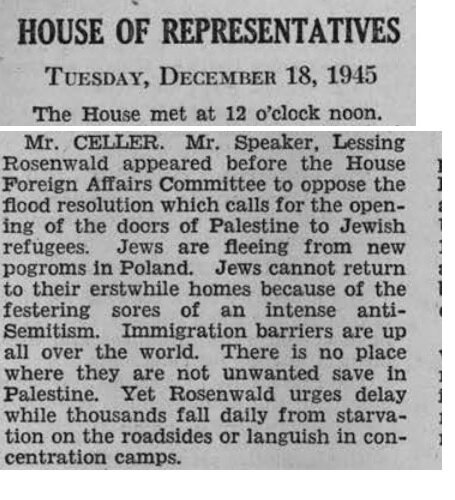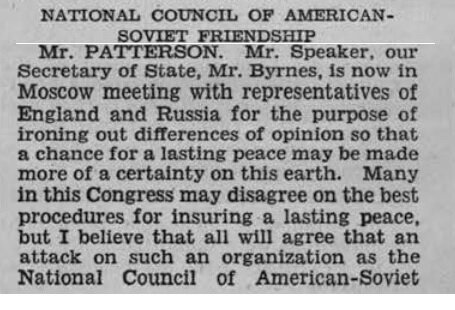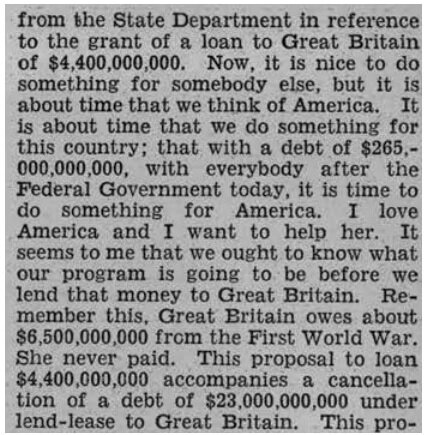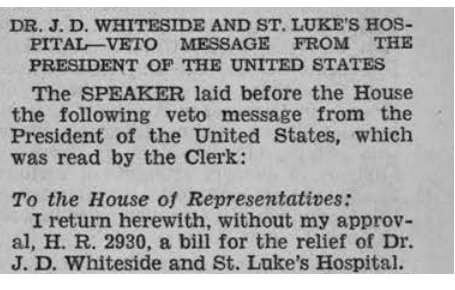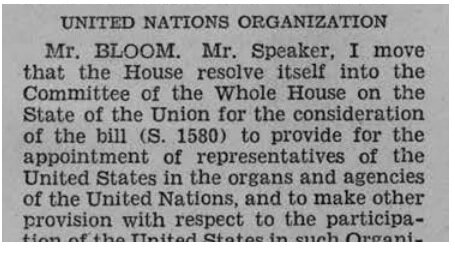Give Him Hell Harry - Truman and the Veto
Background
One main principle of the U.S. Constitution is the separation of powers. Each branch of government, Executive, Legislative, and Judicial, can serve as a check on the other, preventing excessive power in any one branch. The Presidential veto is an example of separation of powers. The President must sign laws passed by Congress. If the President vetoes the bill (does not sign it into law), it takes a two-thirds (67%) vote in the House and Senate to override the President and pass the bill.
Truman Vetoes
President Truman vetoed 250 bills, good enough for third place on the Veto Leaderboard (behind Grover Cleveland and FDR). Congress overrode 12 of those vetoes; only President Andrew Johnson had more of his vetoes overturned.
Almost 150 were bills for individual relief (Private laws, affecting a single person). They are a fascinating slice of our Congress in action. For example, on December 18, 1945, Congress discussed many important issues such as Jewish immigration to Palestine, relations between the Soviet Union and the United States, and financial assistance to financially destitute Great Britain. And then Congress discussed Truman's veto of a bill to pay a doctor and his hospital $6,484.16 for their expenses in treating a rural postal worker kicked by a horse in 1937. The incident occurred 45 minutes before the start of his official workday. However, the worker was harnessing the horses in preparation for his rounds during snowy weather. It seems to me like he had a good case. But Truman vetoed it, stating: "…the Commission has taken an appropriate position [denying the claim] in opposing relief for an injury sustained by a government employee prior to the time he [was scheduled] to report to duty…and would establish an undesirable precedent…" saying the Worker's Compensation decision was correct. Having disposed of that business, Congress went on to discuss the formation of the United Nations.
Vetoes Overridden by Congress
Immigration has been a contentious issue throughout our history. The Immigration and Nationality Act of 1952 (McCarren-Walter immigration act) eliminated the ban on Chinese and Asian immigrants passed in 1882, but established a tiny quota. Truman found the bill too restrictive on immigration, stating: "...this bill would not provide us with an immigration policy adequate for the present world situation. Indeed, the bill, taking all its provisions together, would be a step backward and not a step forward…" He added: "I have long urged that racial or national barriers to naturalization be abolished…But now this most desirable provision comes before me embedded in a mass of legislation which would perpetuate injustices of long-standing against many other nations of the world, hamper the efforts we are making to rally the men of East and West alike to the cause of freedom, and intensify the repressive and inhumane aspects of our immigration procedures…" Congress narrowly overrode Truman's veto.
Another significant Truman veto was the 1947 Taft-Hartley Labor Relations act. As World War II ended, the United States experienced a surge in Union-led strikes. In response, Congress passed this law limiting certain union practices such as secondary boycotts. Congress overrode Truman's veto, and it remains the law to this day.
Other vetoes that Congress overrode included wasteful spending. One example, a bill to provide payments to veterans to help them buy automobiles, but which covered veterans too disabled to drive. Or a law extending additional veterans back to veterans of the Spanish-American War, which had ended 50 years ago.
Some other vetoes of note:
· Income Tax Reductions: Income tax brackets were much higher than today. The lowest tax bracket was 20%, and the highest, 91%. For comparison, current income tax rates range from 10% to 37%. With the end of World War II, and the reduction in military expenditures, Congress voted to reduce tax rates. Truman was concerned about reducing the Federal debt: “With the present huge public debt, it is of first importance that every effort now be made to reduce the debt as much as possible.” He also felt the tax cuts favored the higher income brackets. Congress passed tax reductions three times. Truman vetoed all three attempts. On the third bill, Congress successfully overrode Truman’s veto. (The maximum tax bracket stayed over 90% until reduced to 77% during John F. Kennedy’s administration).
· Internal Security (officially ‘Bill to Protect the United States against certain un-American and subversive by requiring registration of Communist organizations and for other purposes, known as the McCarren Act): With the outbreak of the Cold War against the Communist countries, and the recent outbreak of the Korean War, the 1951 Congress passed a security bill. Critics believed the act posed a risk to First Amendment rights of freedom of speech and association. Truman states - “[the bill] would put the Government of the United States in the thought control business; It would give Government officials vast powers to harass all of our citizens in the exercise of their right of free speech.” Congress overrode the veto. Parts of the bill were held unconstitutional by the Supreme Court. Congress, under President Nixon, repealed the preventative detention part of the bill and eliminated the Subversive Activities Control Board established by the law.
Truman was unpopular near the end of his Presidency and declined to run for re-election in 1952. Now, historians generally rank him as one of our nation’s best Presidents. Some interesting Truman quotations:
· If you can't stand the heat, get out of the kitchen.
· The buck stops here.
· During his 1948 re-election campaign, a Truman supporter yelled out, “Give them Hell Harry.” Truman responded, “I never did give them hell. I just told the truth, and they thought it was hell.”
Truman’s vetoes show a President unafraid to follow through on his beliefs, even bills passed by a large majority in Congress.
(to be continued)
Click for Part 1, Part 2, Part 3, Part 4, Part 5, Part 6, Part 7, and Part 8 of this series)

